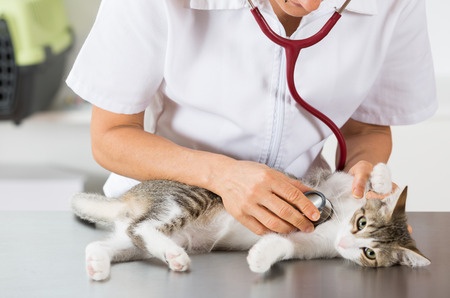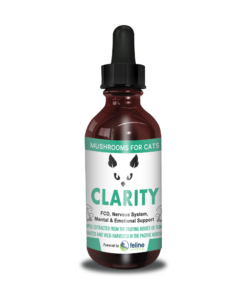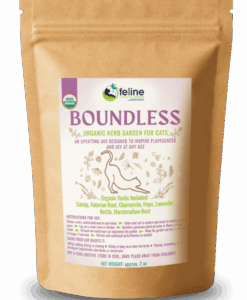As cat lovers – especially of multiple cats – it’s likely we will encountered the diagnosis of feline lower urinary tract disease (FLUTD) at some point. FLUTD is a cluster of different conditions that affects a cat’s urethra and/or bladder. One of the most common types of feline lower urinary tract disease (FLUTD) is feline idiopathic cystitis (FIC), which describes inflammation of the lining and wall of the bladder.
The term idiopathic means “unknown cause.” Having spent many years in the pet nutrition industry, and as a passionate cat parent for the last 20 years, I am disappointed that this term is so often used by veterinary medicine to describe so many diagnoses. While nutritional education is not often included at vet school, there are holistic vets and other specialists that have researched deeper into these ‘unknown’ causes – and the results are very insightful.
According to the studies, 75 to 80 percent of cats who have (or have had) feline idiopathic cystitis (FIC) marked major improvement of symptoms when stress was reduced.
Now. Don’t run and get kitty Xanax just yet – Keep reading first.
Stress leads to a weakened immune system. Stress in cats, however, isn’t just some hereditary issue that we can’t help. Cat stress comes in three main forms:
- Immunity Stress – This is kind of like a double-whammy for our cats. The main reason that cats experience immunity stress is when we give them unneeded vaccinations and medications. The medical field is so often apt to prescribe a new medication every time we enter the vet’s office. Often times they are completely unnecessary. Make sure that the correct testing is being performed if your cat is ill and check to see if there is an alternative medicine that can be used to correct the issue. If your cat is an indoor-only cat, and not at risk for certain diseases, think about slowing down or discontinuing the routine vaccinations.
- Nutritional Stress – This is the result of poor quality cat foods and is (unfortunately) very common for cats to experience nutritional stress. If you buy your cat food at a big chain store department, chances are you are feeding a poor quality food. The marketing is deceptive. Just because it says “fully balanced” or “natural” doesn’t mean that it is. If your cat food contains grains, corn, wheat, additives (those are the things on the label that you can’t read), potentially toxic preservatives or unnecessary fats – it’s time to switch diets. A high-quality canned/wet food diet is recommended. You’ll find the good foods at a smaller (usually family-owned) pet nutritional store nearby. Studies have shown that cats with an antioxidant rich diet have much lower stress levels and stronger immune systems. You can always supplement the antioxidants into their food too.
- Environmental Stress – This comes from a break in (or lack of) routine. Cats need routines. Sometimes we can’t help this – for example, if we have to move houses, have a baby, get new furniture or get a divorce. But the environmental stress can be greatly reduced if you feed your cats at the same time every day, keep the litter box in a comfortable quiet location and encourage regular playtime. They will adapt to the big life changes much better if you keep their routines the same.
Cats internalize stress, so it is not often that you will notice the stress that your cat is enduring. If your cat has feline idiopathic cystitis (FIC), just work to reduce his stress by putting him on a healthy diet, reducing unnecessary vaccines and medications and keeping him on his daily routine.
Reduce Your Cat’s Stress With Cat Calm





Recent Comments